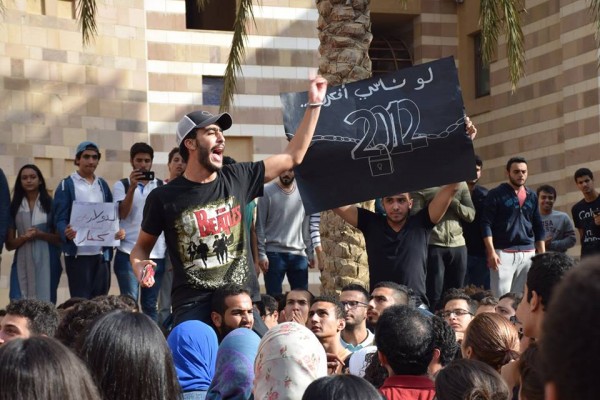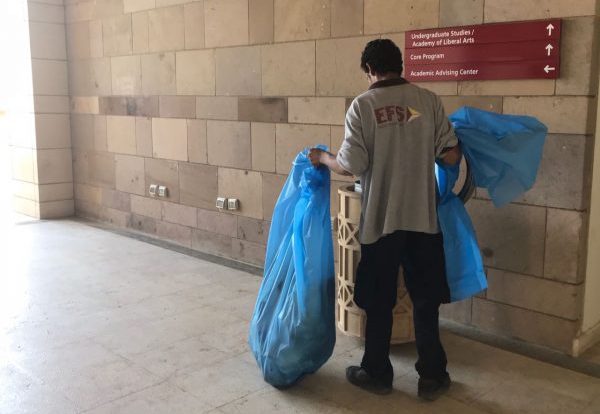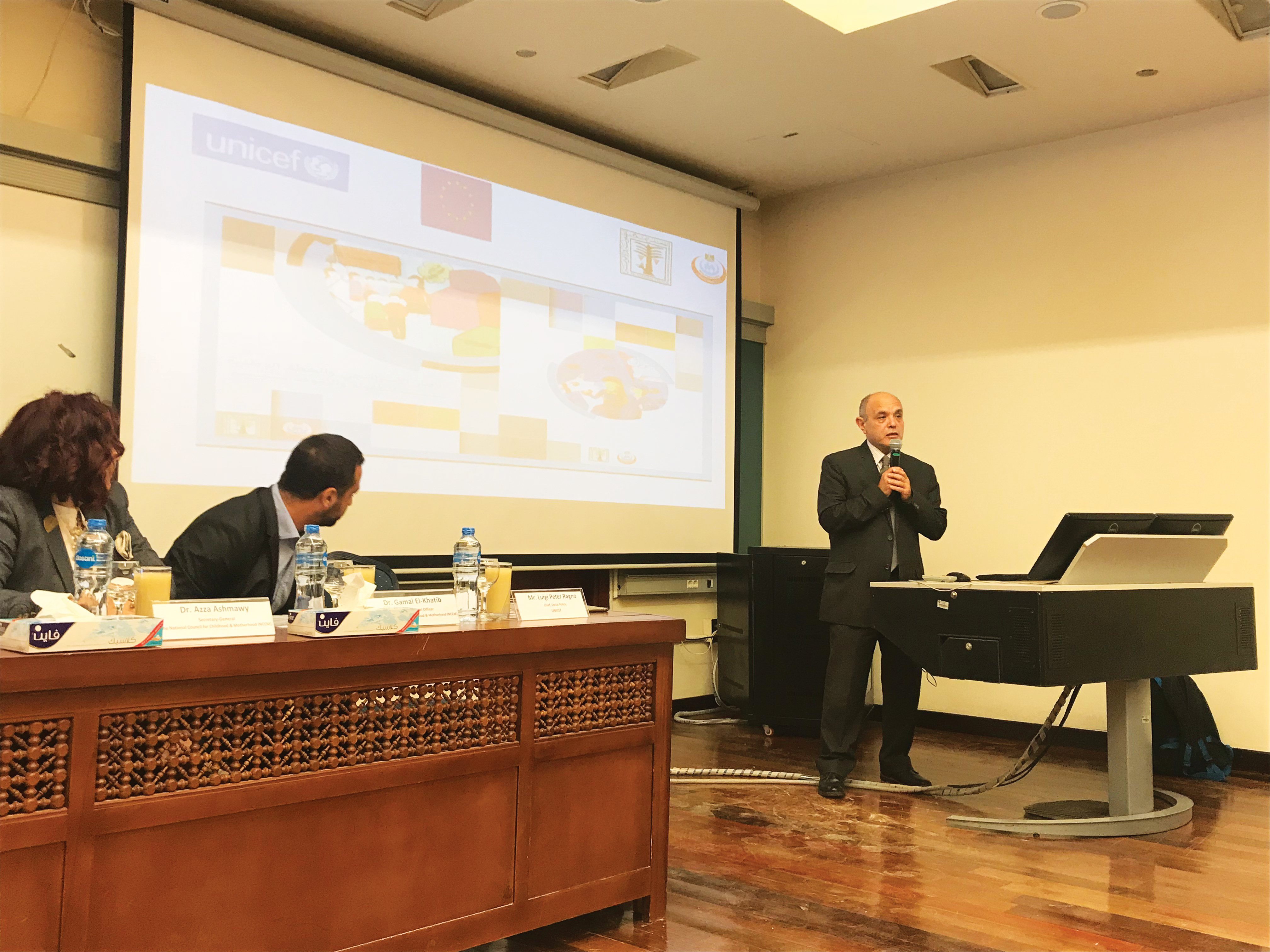The Culture of Protesting: How Far Have We Come Since 2012?
![Some students perceive the increase in tuition fees to be a recurring issue, carrying a banner that reads “If you’ve forgotten, let me remind you of 2012” [Mahmoud Magdy]](http://www.auccaravan.com/wp-content/uploads/2016/11/15027476_1235883939818068_683592806824735933_n-e1479739354292.jpg)
By: Mariam El Menofi and Noura Shibl
@MariamSherif15 @NouraShibl
The administration’s decision to spike the tuition fees in response to the devaluation of the pound sparked student demonstrations that echo similar movements back in 2012.
Since then however, the social and economic conditions of the country have undergone several changes.
The administration, as well, has also seen several changes in its leadership and subsequent methods in handling situations such as these.
TUITION FEES
In 2012, the administration had intended to add a 7 percent increase in the tuition fees for newly admitted students every year.
The Student Union (SU) was able to reach a compromise.
“We managed to cap it at 2.3 percent to lighten the load on the incoming students” Taher Al-Moataz Bellah, an AUC Alumni and the SU President in 2012, told The Caravan.
On November 3, the foreign exchange rate floated leaving several implications for those who had yet to pay their third instalment.
As of November 10, AUC President Francis J. Ricciardone sent out an official email stating that the deferred payment would be fixed at the pre-float exchange rate of 8.88 EGP to the dollar.
This also came as a result of negotiations between the administration and the SU.
However, in 2012 the people were in the grip of the country’s uprisings demonstrating what Al-Moataz Bellah described as a “revolutionary” spirit.
Now, the student body is more constrained by the country’s economic pressures.
In 2014, the administration came to an agreement that students will be paying half the tuition fees in dollars and the other half in EGP.
Executive Vice President for Administration and Finance, Brian McDougall, told The Caravan that the 50-50 split was done to share the risk of the currency fluctuation.
McDougall said that the situation is volatile so that any promises to the student body will put the administration at risk.
FAITH IN THE ADMINISTRATION
What is similar, however, is that throughout the demonstrations students have expressed an underlying distrust in the administration.
This seems to have intensified further this year.
“They did most of the negotiations with the Provost at the time, Medhat Haroun, because they did not trust President Lisa Anderson.” Alaa Abdel Ghani, Affiliate Professor at the Department of Journalism and Mass Communication told The Caravan.
“We all expected the floatation and were reading about it before it actually happened,” Malak Rostom, the current SU Vice President said.
Rostom told The Caravan that the SU is not willing to compromise with the administration this time as they now feel it was wrong to have done so back in 2012.
“It was definitely wrong to compromise, but we felt like it was an accomplishment at the time because of the spirit of the students,” said Mohamed Nabhan, AUC Alumni and one of the 2012 strike participants.
STUDENT ACTIONS
The frustrations of the students took time to escalate in 2012.
However, they became increasingly agitated to the point that they seized the new campus and closed the gates, barring faculty, students and staff from entering the building for three consecutive days.
“I wouldn’t call it violence, but rather it’s a direct action,” Al-Moataz Bellah told The Caravan.
Taher and Nabhan both agree that it only worked at the time because of the pressure it put on the administration.
“I don’t see think that this will happen now as lots of students are still not participating and giving their genuine attention to the strike,” said construction engineering junior Omar Elsherbini.
Rostom also confirmed that the current SU management will not be taking the same actions as did their predecessors in 2012.
According to McDougall, the administration needs time to reach a realistic, sustainable and acceptable solution, recalling what Ricciardone said in the first forum held on November 7.
STAFF CONSIDERATIONS
In 2012, staff concerns were included in the demands of the students.
Now, however, the students have dedicated their enterprise to reaching a decision with regards to the tuition fees.
Rostom told The Caravan that the SU is now considering all strategies so that those most disadvantaged do not get affected.
One of the SU’s avenues is urging students to boycott food outlets on campus, especially Quick, since they all pay monthly rent to the administration.
“Boycotting is a collective act. The food vendors will not be able to sustain themselves for a very long time and will start pressuring the administration
as well,” she said.
Mohamed Fawzy, Butcher’s Burger’s Branch Manager, said that their sales have been cut by
approximately 75 percent since November 10.
He said that while they might have to resort to speaking to the administration, they will not interfere with the students demands.
“Students think that we pay part of our revenue to the admin, but actually we only pay rent,” Subway’s Manager, Kareem Youssef, said.
“Maybe the big difference is that in 2012, the strike was held in September. Now, we’re approaching the end of the semester. If something like that happens again, it will put us in a very difficult situation as we professors try to wrap up the syllabus,” Abdel Ghani said.
Many among the student body feel as though not much has changed since 2012.
Yet, the added pressure of the economic situation in Egypt and the administration’s inability to provide immediate results leaves the question of further action open.



